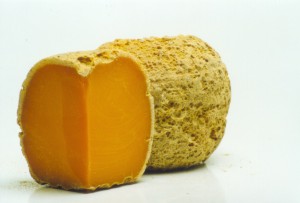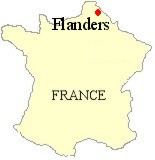
|
|
||||||
The Mimolette is a most unusual cheese, spherical like an Edam but with a rough moon-like surface and a bright orange interior. It resembles a melon when cut open. The cheese originated in Holland and is made in a similar way to Edam. It is believed to have been introduced to France when Flanders was a part of that country. Some believe that in the 17th century the French minister Colbert forbade the importation of foreign goods, including cheese, and so the French began making it for themselves. It is now made in Flanders and also in other parts of France, particularly Brittany, and it is often known as 'Boule de Lille'. The name Mimolette derives from 'mi-mou' meaning 'half-soft'. The name Boule de Lille derives from a ripening cellar in the city of Lille, where the cheese was originally matured. Maturing the cheeses involves storing them in damp cellars and turning them every week. At the same time the surface of the cheese is brushed to remove cheese mites which feast on its surface. As the cheese ages, evidence of mites can be seen in the pitted and moon like surface which appears on the cheese. Mimolette can be eaten young but is usually matured for a minimum of six months when it is called 'demi-étuvée' or 'demi-vielle' (half old). The texture is firm and oily and the colour a vivid orange. With ageing it slowly hardens and dries and the colour changes from carrot to orange-brown. At twelve months it is called 'vielle en étuvée' (old) and at two years it is called 'très vielle' (very old). We mature ours to 18 months since we believe it gives the best combination of texture and flavour - we call it Mimolette Vieux (or Vielle). It has a firm texture with a very nutty flavour and a thick brown-grey crust. The cheese is not a perfect sphere but is slightly flattened at both ends. Each Mimolette has a diameter of 20cm, weighs between 3 and 4kg, and has a fat content of 40%. All Mimolette is made using pasteurised cows' milk. Mimolette is excellent on the cheese board but can also be used in canapés and for grating. Click here or press your 'Back' button to return |
|
||||||
| All articles © www.teddingtoncheese.co.uk | |||||||
